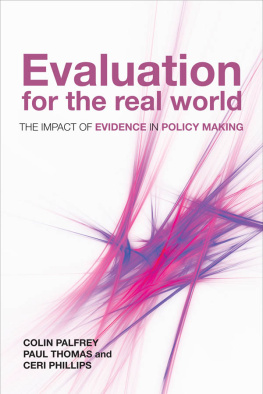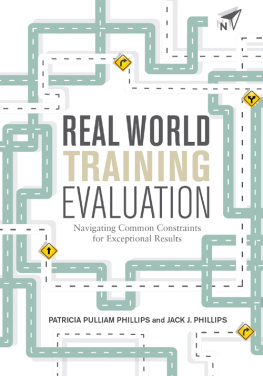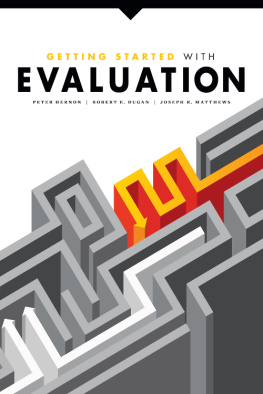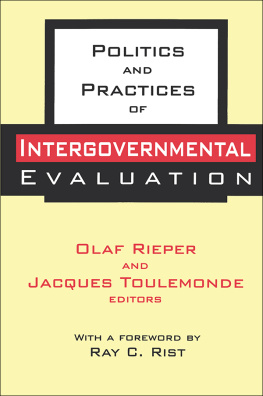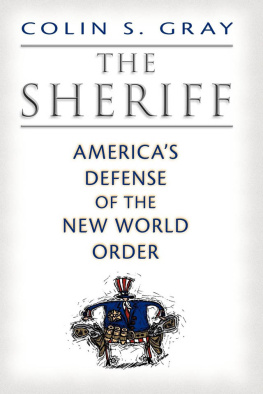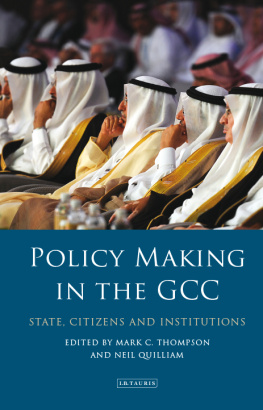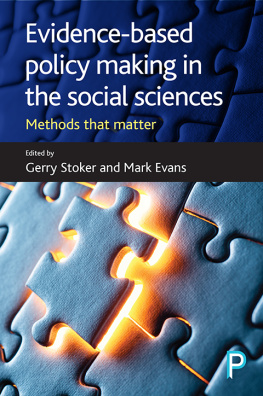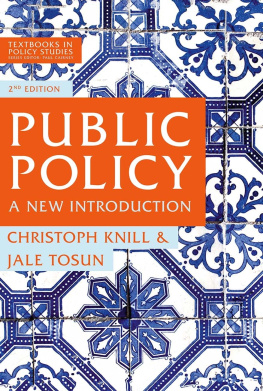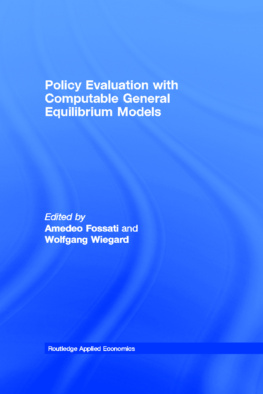First published in Great Britain in 2012 by
The Policy Press
University of Bristol
Fourth Floor
Beacon House
Queens Road
Bristol BS8 1QU
UK
Tel +44 (0)117 331 4054
Fax +44 (0)117 331 4093
e-mail
www.policypress.co.uk
North American office:
The Policy Press
c/o The University of Chicago Press
1427 East 60th Street
Chicago, IL 60637, USA
t: +1 773 702 7700
f: +1 773-702-9756
e:
www.press.uchicago.edu
The Policy Press 2012
British Library Cataloguing in Publication Data
A catalogue record for this book is available from the British Library.
Library of Congress Cataloging-in-Publication Data
A catalog record for this book has been requested.
ISBN 978-1-4473-0845-4
The right of Colin Palfrey, Paul Thomas and Ceri Phillips to be identified as authors of this work has been asserted by them in accordance with the 1988 Copyright, Designs and Patents Act.
All rights reserved: no part of this publication may be reproduced, stored in a retrieval system, or transmitted in any form or by any means, electronic, mechanical, photocopying, recording, or otherwise without the prior permission of The Policy Press.
The statements and opinions contained within this publication are solely those of the authors and not of The University of Bristol or The Policy Press. The University of Bristol and The Policy Press disclaim responsibility for any injury to persons or property resulting from any material published in this publication.
The Policy Press works to counter discrimination on grounds of gender, race, disability, age and sexuality.
Cover design by The Policy Press
Front cover: image kindly supplied by Patrick Hajzler
Printed and bound in Great Britain by Henry Ling, Dorchester
The Policy Press uses environmentally responsible print partners
Readers Guide
This book has been optimised for PDA.
Tables may have been presented to accommodate this devices limitations or/and use scroll function for a complete review of the tables as and where needed.
Image presentation is limited by this devices limitations.
In the UK the formal evaluation of public services has a relatively brief history. Discovering what impact various social policies, programmes and projects have had on the intended beneficiaries makes political and economic sense. Why, one might ask, has evaluation had such a relatively limited pedigree?
Part of the explanation could perhaps lie in the response from several medical practitioners in the 1970s and 1980s who considered the movement towards evidence-based medicine as an unwarranted assault on their professional wisdom and integrity.
Laboratory experiments testing the effectiveness of drugs for treating a whole range of conditions had been carried out for decades. However, the origin and nature of the evidence have often stimulated controversy. A prime example of this was the resistance to acknowledging the well-founded evidence that smoking cigarettes caused lung cancer. It was not only the vested interests of the tobacco manufacturers and retailers that proved obstructive. Some in the medical profession many of whom were themselves smokers continued to advocate smoking as beneficial.
Research findings that challenge conventional wisdom and traditional practices often cause consternation among individuals and groups who see their customs and practice as potentially under threat. For some, change can be very uncomfortable.
Nevertheless, in spite of initial opposition from some quarters, evidence-based medicine, with its emphasis on the randomised controlled trial as the primary, if not the sole, method of producing cogent evidence, became widely accepted as the gold standard on which to base professional practice.
While evidence-based medicine focused at the outset on the effectiveness of certain drugs and other clinical interventions, politicians and civil servants in countries where health services were funded wholly or substantially by the state began to take an interest in the comparative costs as well as the impact of treatments on peoples health. Such a consideration also had relevance where access to health services depended on an individuals ability to pay, often through health insurance systems.
Although academic articles and books began appearing in some numbers in the USA during the 1960s, there was little academic or political interest in formal evaluation in the UK until two decades later. It would appear that in the UK, for example, the formulation of a policy, particularly when enshrined in legislation, was deemed sufficient to ensure its full implementation and once implemented to have the intended effect.
However, it is highly probable that the movement towards evidence-based medicine impinged on the world of civil servants and politicians. Certainly with the Thatcher Conservative government in the 1980s questioning the value of the public sector in terms of its efficiency, major projects and initiatives notably in the National Health Service came under close scrutiny. Government spending on public sector services now had to prove its cost-effectiveness.
In the UK this concern with efficiency spawned a number of government documents directed at policy advisers. Politicians now needed to know what works and at what cost. This emerging culture of evidence-based policy prompts the question of how evaluation research commissioned by governments influenced or even shaped central policy.
It is on this question that our book focuses. Given the plethora of learned articles and books on the subject of evaluation over the past 50 years or so, what evidence is there that evaluation research in its many manifestations commissioned project evaluation, policy evaluation, theory-driven evaluation has had an impact on public policy at central and more local levels? In short, how cost-effective has evaluation research been?
The book examines the possible reasons why academics, in particular, appear somewhat sceptical, if not despondent, about the outcome of their research-based findings. Those who make decisions about allocating taxpayers money to a range of policies and their embodiment in programmes and projects, are not bound by any contractual arrangements to act on the results of evaluation research whether this has been designed and delivered by academics or by research-oriented private companies.
We contend that the exploration of the impact of evaluation research on public policy is long overdue.
The primary purpose of this book is to examine the development of evaluation and its impact on public policy. This will involve a critical analysis of much of the evaluation literature generated mainly in the USA and the UK from the 1950s onwards. In particular, we shall be seeking published accounts of empirical research which has reported on attempts to identify clear evidence of a link between formal evaluation results and policy formulation. The text will also focus on the application of theory-driven evaluation to policy making.
Although discussions of data collection methods, research designs and the selection of criteria for evaluating policies, programmes and projects are included (), this book is not intended to be something akin to an evaluation handbook. These chapters contribute to the key theme of the book, which centres on the interface between the academic and political worlds.

